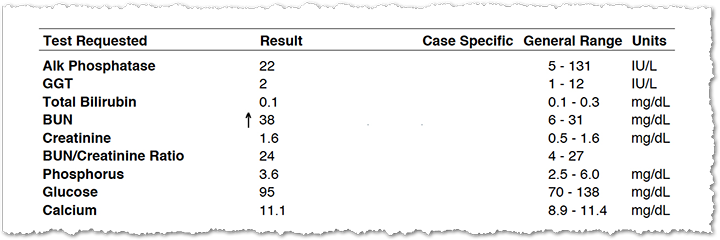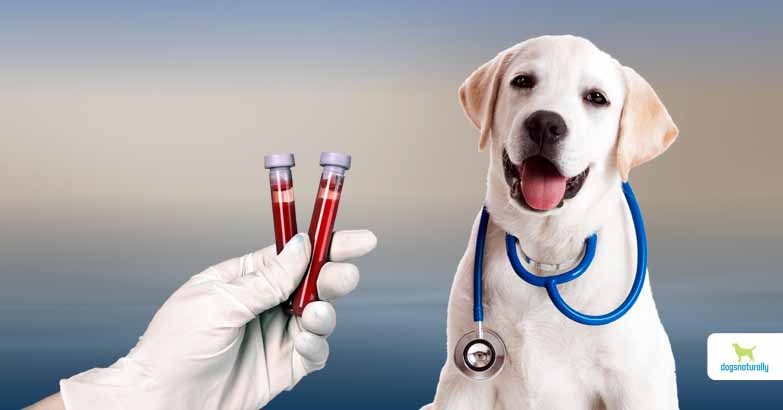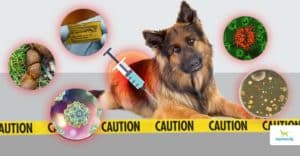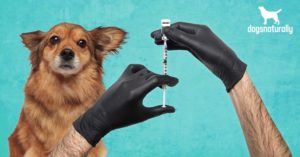Do you find dog blood tests confusing? Or wonder how useful they are? Do you need to do all the tests your vet recommends? If you skip dog blood tests, you may worry you could miss something important.
Veterinarian Randy Kidd DVM PhD holds a PhD in Clinical Pathology. So he knows what he’s talking about when it comes to dog blood tests. We’ll share his recommendations for tests you might need at different stages of your dog’s life.
But first, let’s look at some questions to consider before getting a blood test for your dog.
Questions To Ask Before Getting Dog Blood Tests
It’s important to know what you want to get out of a blood test. So here are some questions to ask yourself before heading to the vet.
What Do You Want To Know?
We all want the very best for our dogs. But do you want a definitive diagnosis or are you willing to live with a bit of ambiguity?
Are you a “wellness” person who uses nutrition and supplements for preventive health? Or are you a “treatment” person, waiting until something goes wrong to take action?
What Are Your Concerns?
Is there something you’re afraid might happen to your dog that a blood test can reassure you about or confirm for you?
Is your dog’s breed predisposed to specific health issues? Getting early warning of a developing problem could be helpful in managing treatment.
What Will You Do With The Results?
Are you going to do anything differently based on the test results? Are you considering making a change to your dog’s diet or general care?
If you suspect your dog has a health issue and lab tests confirm it, what are you going to do differently? If you don’t plan to make any changes based on the results, then there’s no reason to test.
How Much Can You Afford?
Unfortunately finances are always a factor in medical decision-making. If you’re on a tight budget, talk to your vet about which tests make the most sense for your dog’s current age and needs.
How Useful Are The Tests?
Blood chemistry panels can be a valuable diagnostic tool. But there are some limitations.
Most blood chemistry tests evaluate the function of an organ or cell type. They don’t usually identify the exact cause of an abnormal test finding. And they rarely pinpoint a specific reason for your dog’s condition or disease.
Are Dog Blood Tests Accurate?
In Dr Kidd’s view, the key to any test is: “Is it the truth, the whole truth and nothing but the truth?” And that is questionable.
Not all tests are accurate or reliable … so if a test only has 50-50 reliability, it’s not very helpful. And test results are snapshots. They give a quick picture of what’s happening at the moment the test is done.
Many times test results don’t provide a black and white answer. An abnormal result is just part of the bigger picture of your dog’s health.
For example, if your dog’s BUN (Blood Urea Nitrogen) results are high, that might be a sign of kidney disease … or it might just mean your dog was dehydrated when the test was done. BUN rises with dehydration.
Good food also raises BUN. The nitrogen in the protein sources elevates the blood chemistry. So dogs fed a raw meat diet will often have higher BUN.

RELATED: Read more about how diet affects dog blood work …
Bloodwork For Dogs
Here’s Dr Kidd’s recommendation for an ideal lifetime wellness blood chemistry monitoring program …
Young Dog Blood Tests
Shortly after your dog reaches adulthood, run a regular chemistry panel. One like a SMAC-20 will provide 20 different blood chemistries. This test is a great tool to use as a part of the dog’s permanent record. You can compare it with chemistry panels taken later in life. This will help identify your dog’s health trends and catch any changes.
And if the tests show any abnormalities at this young age, there’s a better chance of stopping them from becoming worse.
Along with the chemistry panel, your vet may also suggest a …
- Complete physical exam
- CBC (Complete Blood Count)
- Urinalysis
- Thyroid panel
- Fecal analysis
- Other test that might be indicated for your breed or individual dog
The chemistry panel should be the one that the most convenient veterinary diagnostic laboratory uses as their normal panel. Even if your veterinarian has an in-house lab, ask her to send the samples to a veterinary reference lab. There are two reasons for this:
- In-house labs are (for many reasons) notoriously inaccurate
- Human diagnostic labs may not have established normal values for animals and they may use techniques that give inaccurate values in animals
Blood Tests For A Middle-Aged Dog
When your dog’s about 7 or 8 years old (middle-age for most breeds), consider getting …
- Annual physical exams
- Chemistry panels (with appropriate add-ons)
- CBC
- Urinalysis
Make sure your veterinarian compares these results to your dog’s young adult values. She should be able to spot any ongoing trends that could be helped with additional holistic support. Dr Kidd says that this monitoring would make him feel very comfortable making treatment decisions for almost any emergency.
Dog Blood Tests For Decision-Making
Before making decisions about a major non-emergency procedures, Dr Kidd recommends …
- Chemistry panels
- CBC
- Urinalysis
Dog Blood Tests For Specific Organs
There are also tests designed to evaluate specific organs or organ systems.
Liver Panel Example
- Alanine Aminotransferase (ALT)
- Aspartate Aminotransferase (AST)
- Alkaline Phosphatase (ALP)
- Gamma Glutamyl Transferase (GGT)
- Bilirubin (total and direct)
- Total Protein
- Albumin
- Globulin
- A:G ratio
- Cholesterol
RELATED: Read a veterinarian’s guide to what elevated liver enzymes in dogs mean …
Pancreas Panel Example
- Glucose
- Amylase
- Lipase
- Cholesterol
- Triglycerides
Muscle and Bone Panel Example
- Calcium and phosphorous (bone)
- Creatine Kinase (CK or CPK)
- Aspartate Aminotransferase (AST) muscle damage, trauma, or inflammation
- Electrolytes
Kidney Panel Example (Urinalysis)
- Blood Urea Nitrogen (BUN)
- Creatinine
Thyroid Panel Example
- Total T4
- Free T4
- Total T3
- Free T3
- Canine Thyroglobulin
RELATED: Read about hypothyroidism in dogs and why it’s important to do a full thyroid panel …
Usually the organ-specific panels are run in combination with a complete physical, CBC, and urinalysis.
What Are Dog Blood Test Normal Values?
The “normal” ranges will vary with different labs. When you get your dog’s blood test results, the report should show you your dog’s numbers. You should also see the “normal” range for each item. The lab will usually flag any results that are out of the normal range, whether high or low. You’ll want to ask your vet for help in understanding dog blood test results. She’ll explain what your dog’s results mean when they’re not within the normal range.
How Much Is Dog Blood Work?
The costs vary widely depending on the test and where you live. A full chemistry panel and complete blood count should cost around $170 to $200. If you’re at the emergency vet, expect higher prices.
DNM RECOMMENDS: Maintain your dog’s overall health with Four Leaf Rover’s Protect, a daily soil-based probiotic that supports the immune system and helps remove toxins. Buy Protect now >>
Dog Blood Tests Are Only Part Of The Picture
Remember, dog blood tests are useful but they don’t tell the whole story. Dr Kidd recommends using other tools to gauge your dog’s health. These include hands-on physical exams and other diagnostic tools when necessary. And a holistic veterinarian might include things like chiropractic or acupuncture assessments …
In Dr Kidd’s view, the most important test that you can do is simply observing your dog! After all, you know your dog better than anyone, and you’re the one who’ll notice changes that suggest your dog isn’t feeling his best.
References
TJ Whitbread BSc, BVSc, MRCVS, DECVP. Clinical Biochemistry. Merck Veterinary Manual. June 2016.














